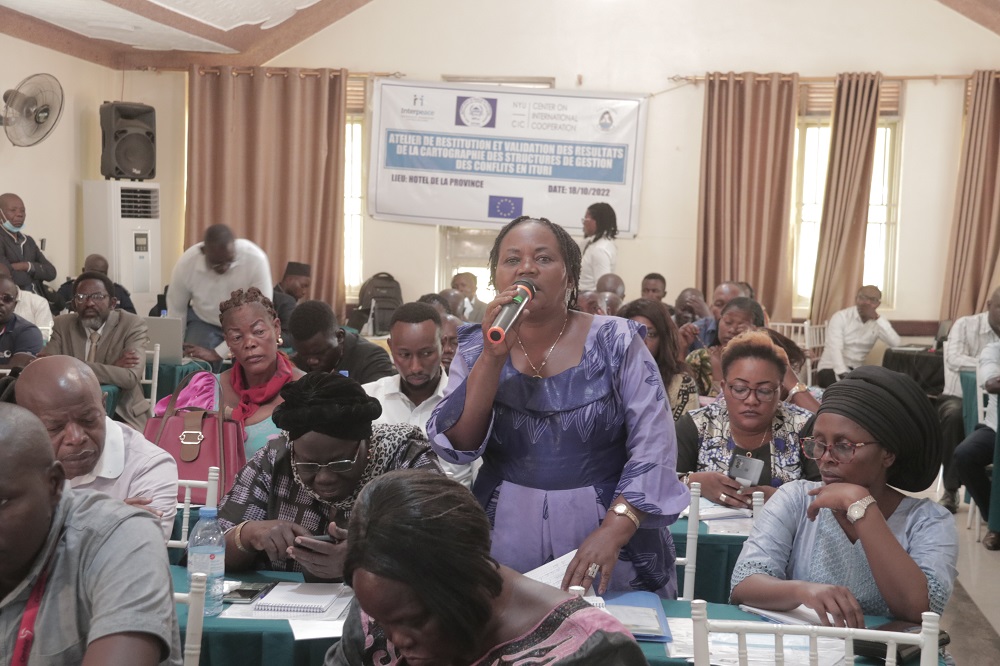Students in the DRC meet with officials and community leaders to discuss ways to solve the crisis in Ituri

The youth have a role to play in achieving lasting peace in the province of Ituri, in the Democratic Republic of Congo (DRC). To strengthen collaboration with the authorities, students met with Bunia leaders and an advisor to the governor on 27 January 2023 at a public forum hosted at the University of Bunia. At the invitation of the consortium comprised of Interpeace, Action for Peace and Concord (APC), the Pole Institute, and the Center for International Cooperation at New York University, peace issues and challenges for youth involvement were put on the table in a no-holds-barred discussion.
Students were encouraged to openly share their views in order to appropriately explore conflict concerns. In response to issues discussed, Irene Vahweka, the governor's advisor for youth issues, explained how including the youth in discussion pertaining to the country’s current volatile situation could be a chance to bring peace to the region. For her, the issue of resilience and peace in Ituri primarily involves the involvement of the youth.
According to Ms. Vahweka, the current approach of the provincial governor, in collaboration with other key stakeholders, to establish frameworks for inter- and intra-community dialogue should facilitate peacebuilding by providing a platform for constructive discussions. By fostering open dialogue between and within communities, the governor's initiative is likely to prove invaluable in preventing the escalation of tensions.
"You must not cross your arms; you must sensitise other young people to the volatility being experienced and let them be involved in peacebuilding dialogues because its success will allow the development of Ituri," she said.
This public meeting allowed several young people to express themselves freely before the authorities. For Daniel Ambunga, this format must be repeated regularly to encourage young people to denounce what is not working in the region.
"This province is still young. It has four major ethnic groups. With conflicts, we won't get anywhere. Back home, people are being killed every day. Spaces like this allow us to present the situation of our environment, where rebels circulate freely. We, the youth, are capable and our contribution is to be able to express ourselves through such meetings," says this student.
The public forum offered a platform for several young people to express themselves freely before their community leaders and authorities. Daniel Ambunga, a student at the university, believes that this dialogue forum should be perennial to encourage young people to speak out about the issues affecting the region and have their voices heard.
“This province is still relatively young, with four major ethnic groups. Without resolving conflicts, we will not be able to move forward. Back home, people are being killed every day. Spaces like this allow us to present the situation of our environment, where rebels circulate freely. We, the youth, are capable and our contribution is to be able to express ourselves through such meetings,” the student declared.
Like him, Emérence, a student at the same university, expressed her satisfaction with the answers given to her various questions related to community disarmament, demobilisation and reintegration process (CDRP) and its level of progress. However, she called for decisive action in dealing with conflict-related issues.
Among the participants was the president of the Provincial Youth Council, Gentil Kaniki, who asked the authorities to always involve young people in the peace process and welcomed the establishment of open platforms for discussion.
"It is a means that allows young people to present the real problem and challenges in order to propose solutions in complicity with the various stakeholders," he explains. He stated that in order to strengthen the connection between the youth and the authorities, such initiatives should be extended to the province's interior.
This forum for public dialogue is part of the programme, funded by the European Union, to support mediation for resilience and peace in Ituri and Greater North Kivu.

